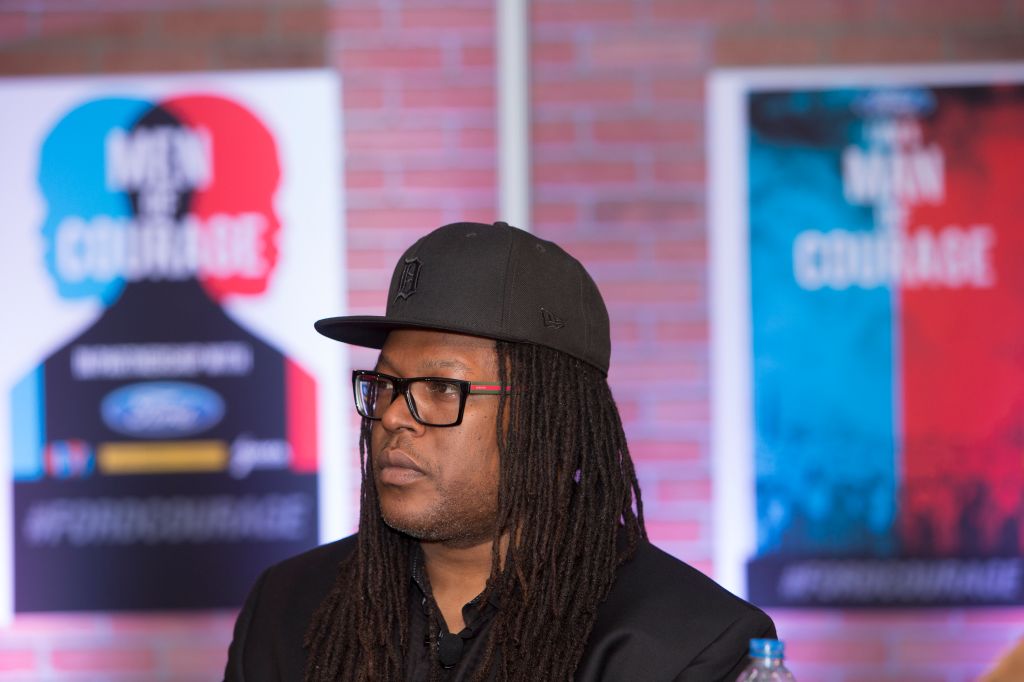
Source: Monica Morgan / Getty
Mass incarceration has been a buzzing topic for quite some time, with academics, politicians, pundits and activists dominating the discourse. Yet, for all the attention the subject has gotten, there is a serious missing piece of the conversation: What happens to the parents, sons, daughters, and friends who are snatched out of our communities once they finally make it home?
Shaka Senghor knows all too well how difficult it is to transition back into society. He was convicted of second-degree murder at the age of 19— when he was, in his own words, “a drug dealer with a quick temper” who’d escaped an abusive home and found a life of trouble on the streets. The Detroit native would spend 19 years in prison, seven of them in solitary confinement.
Today, the Detroit native is a world-renowned criminal justice advocate and the author of Writing My Wrongs: Life, Death, and Redemption In An American Prison; his 2014 TED talk “Why Your Worst Deeds Don’t Define You” has been viewed over a million times. Senghor teamed up with none other than Oprah Winfrey to highlight what happens after incarceration. The result is Released, a powerful eight-part series that debuted on OWN earlier this month.
We spoke to Senghor about Released and how society fails to attend to the needs of formerly incarcerated people.
CASSIUS: How do families typically fail their relatives when they return home following incarceration?
Shaka Senghor: I think one of the ways that families fail people who are incarcerated is by not being there through their incarceration and not ensuring that they have the things that they need to prepare them for life after prison. It’s in my experience that the men and women who tend to shift their thinking and turn their lives around are typically the people who get the most support while they’re incarcerated. They get the things that they need to kind of rethink life.
C: What can we do to help people prepare to come home?
SS: We have to deal with the mental health issue inside prison. I think that we have to stop utilizing solitary confinement to torture people and we have to infuse the type of education that’s gonna be beneficial to a person coming home when it comes to what type of resource they need.
C: Many people think prison is like Orange Is The New Black, but forget that Piper (the lead character) is from a family that is well positioned to help her. How can less privileged families best support their loved ones who are behind bars?
SS: The most important resources we have are love, understanding, and compassion. Piper is actually a friend of mine, and we talk a lot about the perception of the show and how people think that’s the only way a person can make it through that situation. But a lot of times we have more resources than we give ourselves credit for. We tend to think only monetarily, but often people need more than just money. You need somebody who can support you, who can help you learn the things that you need to reposition yourself in society. I tell my friends all the time if you have a loved one that’s incarcerated, writing them can be the difference between them staying hopeful and positive and them being broken by the system.
C: There are many young people who are unable to find jobs, which leads to some of them making choices that land them behind bars.
SS: We’re in a very critical time right now where children are basically counted for prison before they get out of elementary school. I think the responsibility of the community is always to empower men and women with the resources that they need, whether it’s for employment, entrepreneurship, or investing and saving money. Somebody needs to lead the charge, and I think the millennial generation is definitely gonna be the one to do that.
C: Do you think entrepreneurship will save us from the cultural barriers that leave us economically disenfranchised?
SS: I’m a big advocate for entrepreneurship, but I think it’s a combination of things. In addition to entrepreneurship, we need knowledge in investments. We just don’t have a high level of financial literacy. I think those conversations are important even in this show as these men and women are making decisions about their lives. You’ll see a lot of that reality show up.
C: How do you think respectability politics play into that?
SS: I think it’s trash. I think that we need to be more honest about things instead of being politically correct and running the safe route when it comes to issues that impact our community. There’s this extremism, this disregard for other people’s humanity, that’s not healthy. I think that if you want to solve a problem you gotta find common ground. If you want to shift culture, if you want to shift change, when it comes to policy the same thing has to happen.
Released airs on OWN on Saturdays at 10 p.m. EST. Check out Shaka Senghor’s website for more information about his work.
















